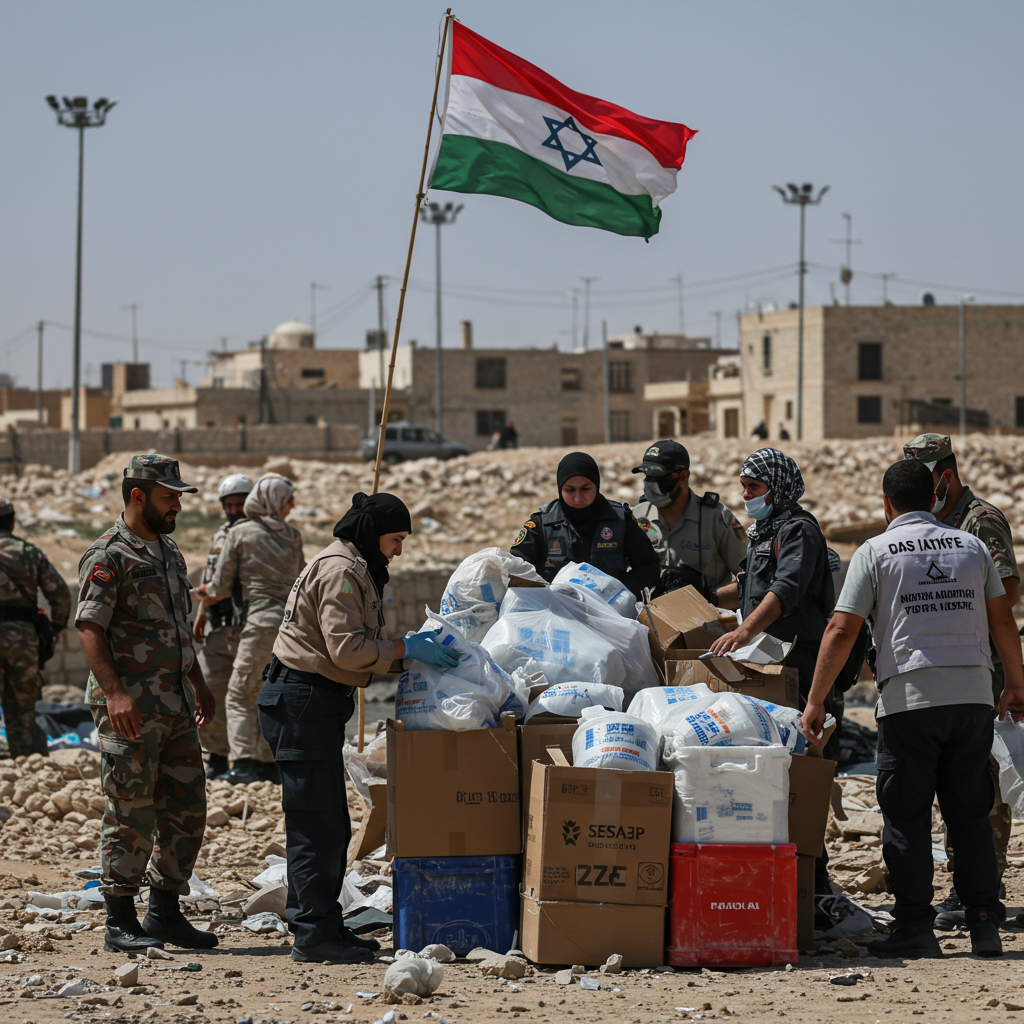The ongoing Gaza Hostage Crisis continues to reveal harrowing details of human suffering. Recent reports, amplified by distressing propaganda videos, have brought the severe plight of Israeli captives to the forefront. These images depict extreme emaciation and psychological torment, prompting global outrage. International leaders are responding with renewed calls for action and intensified humanitarian efforts within Gaza.
The situation underscores the complex challenges of delivering aid in a volatile conflict zone. It also highlights the urgent need for international intervention to secure the release of all hostages. This deeply concerning development is shaping diplomatic discussions and humanitarian strategies worldwide.
The Disturbing Hostage Revelations
A recent video released by Hamas, the militant group, has sent shockwaves globally. It reportedly showed 24-year-old Israeli hostage Evyatar David in an extremely emaciated state. The video disturbingly depicted him digging what he was told was his own grave within a confined tunnel. This graphic display of suffering sparked widespread condemnation.
The footage serves as a stark reminder of the immense cruelty endured by those held captive. David’s condition, described as a “living skeleton,” illustrates the dire circumstances faced by hostages. This deliberate starvation technique is viewed as a calculated act of psychological warfare. It aims to exert pressure on Israeli authorities and the international community.
Evyatar David’s Ordeal
Evyatar David’s family has spoken out about the horrifying video. They described witnessing their son “deliberately and cynically starved in Hamas’s tunnels.” His brother, Ilay, revealed the terrifying reality of their condition. He warned that the hostages might have “only days left to live.” This desperate plea highlights the urgency of the situation for all captives.
The family stated that Hamas is using Evyatar as part of a “horrific and calculated campaign of cruelty.” They consider it a “live hunger experiment,” designed for “depraved propaganda.” This specific act is described as a brutal assault on human decency. Such actions violate fundamental principles of international law.
Family’s Heartfelt Plea
The families of Israeli hostages have gathered in Tel Aviv’s Hostages Square to protest. They demand an immediate ceasefire and a hostage release deal. Their public demonstrations aim to keep the plight of their loved ones at the forefront of global attention. They emphasize the unimaginable suffering endured by those in captivity.
Prime Minister Benjamin Netanyahu has met with the families of Evyatar David and Rom Braslavski. Braslavski was another hostage seen in a similarly emaciated condition. Netanyahu expressed his profound shock and grief over the distributed materials. He assured the families that efforts to secure the return of all hostages are constant and relentless.
Netanyahu’s Strong Condemnation
Following the release of the disturbing hostage video, Israeli Prime Minister Benjamin Netanyahu issued a forceful statement. He condemned Hamas’s actions, calling their cruelty limitless. Netanyahu emphasized that Israel is actively facilitating humanitarian aid into Gaza. In contrast, Hamas is deliberately starving hostages for cynical purposes.
His response highlights the dual narrative emerging from the conflict. Israel asserts its commitment to humanitarian principles while accusing Hamas of egregious violations. This distinction is crucial in shaping international perceptions and responses. It also frames the ongoing diplomatic challenges.
Comparing Tactics to Nazi Abuse
In his strong condemnation, Prime Minister Netanyahu drew a stark comparison. He likened Hamas’s treatment of hostages to “Nazi abuse.” This powerful analogy underscores the perceived barbarity and inhumanity of the captors’ actions. It aims to evoke a strong moral response from the international community. Such comparisons are highly charged.
They seek to rally global support against Hamas, branding their methods as beyond acceptable conduct. Netanyahu urged the world to take a clear stand against these criminal acts. His rhetoric aims to consolidate international opinion against the militant group. It frames the conflict in moral and ethical terms.
Ongoing Efforts for Hostage Return
The primary goal for Israel remains the safe return of all its citizens held captive. Negotiations for a ceasefire and hostage-release deal have recently reached a standstill. This has led to the withdrawal of negotiators from Doha, Qatar. The impasse prolongs the agony for hostage families and intensifies the humanitarian crisis.
Despite setbacks, official statements affirm that efforts continue relentlessly. The pressure from families and international bodies drives these ongoing diplomatic endeavors. Securing the release of hostages is a complex process. It involves intricate negotiations amidst a highly volatile and unpredictable environment.
US Diplomatic Response and Humanitarian Focus
The United States plays a significant role in mediating the conflict and addressing humanitarian concerns. Recent visits by US officials underscore this commitment. Their objective is to gain a direct understanding of the situation on the ground. This helps in crafting effective aid delivery strategies.
The US stance emphasizes prioritizing assistance to civilians, not militant groups. This distinction is critical in ensuring aid reaches those who need it most. Such diplomatic engagement reflects a multifaceted approach to the crisis. It combines political negotiation with practical humanitarian efforts.
Huckabee and Witkoff’s Gaza Visit
U.S. Ambassador to Israel Mike Huckabee and Special Envoy to the Middle East Steve Witkoff recently visited Gaza. Their visit lasted over five hours. The purpose was to assess the humanitarian situation directly. They met with the Gaza Humanitarian Foundation and other agencies on the ground. This hands-on approach aims to inform US policy.
Their visit sought to provide President Donald Trump with a clear understanding of the crisis. It also aimed to help develop a plan for delivering food and medical aid. This strategic engagement highlights the US commitment to alleviating suffering. It also reflects an effort to ensure accountability for aid distribution.
Prioritizing Aid for Civilians
Chapin Fay, a spokesperson for the Gaza Humanitarian Foundation, commented on the US visit. He stated that the visit reflected the understanding that “feeding civilians, not Hamas, must be the priority.” This statement emphasizes a critical principle in conflict zone aid delivery. It is vital to prevent aid diversion to militant groups.
Ensuring aid reaches the most vulnerable populations is a complex logistical and ethical challenge. International bodies and aid organizations work tirelessly to overcome these obstacles. Their efforts aim to mitigate the humanitarian crisis affecting Gaza’s residents. This focus remains a cornerstone of international intervention.
Legal and Ethical Dimensions of Hostage Treatment
The treatment of hostages in armed conflicts is governed by strict international laws. These laws aim to protect individuals who are not directly participating in hostilities. The reported conditions of Israeli hostages in Gaza raise serious concerns. They appear to constitute grave breaches of these foundational legal frameworks.
International humanitarian law, specifically the Geneva Conventions, prohibits the taking of hostages. It also mandates humane treatment for all detainees. Deliberate starvation, psychological torture, and public humiliation are clear violations. Such acts undermine the very fabric of human dignity and legal order.
International Law Violations
Hamas’s actions, as depicted in the videos and described by families, directly violate international humanitarian law. The deliberate starvation of captives is a war crime. Using individuals as human shields or for propaganda purposes also constitutes severe breaches. These are considered fundamental prohibitions in armed conflict.
Organizations like the International Committee of the Red Cross (ICRC) advocate for adherence to these laws. They call for the immediate and unconditional release of all hostages. The international community has a responsibility to condemn and address such violations. This includes holding perpetrators accountable under international legal frameworks.
Psychological Warfare and Propaganda
The release of deeply disturbing videos of emaciated hostages serves a dual purpose. It functions as a form of psychological warfare against the captives and their families. It also acts as a propaganda tool. These videos aim to create maximum emotional distress and exert political pressure. They are designed to sow fear and desperation.
Such tactics exploit human suffering for strategic advantage. They seek to manipulate public opinion and influence negotiation outcomes. Understanding the intent behind these propaganda efforts is crucial. It helps in formulating effective responses that prioritize humanitarian concerns. Countering these narratives requires clear, factual communication.
The Broader Context of Gaza Humanitarian Crisis
The suffering of Israeli hostages occurs within the broader context of a severe humanitarian crisis in Gaza. The conflict has led to widespread displacement, destruction, and a critical shortage of essential resources. Access to food, water, medical supplies, and shelter remains a significant challenge for the civilian population.
International organizations are working to provide aid despite immense operational difficulties. Blockades, security concerns, and damage to infrastructure complicate delivery efforts. The situation requires a sustained and coordinated international response. This aims to alleviate the suffering of all civilians impacted by the conflict.
Frequently Asked Questions
What shocking details emerged regarding Israeli hostage conditions in Gaza?
Recent videos released by Hamas have revealed distressing details about the condition of Israeli hostages. One video reportedly showed 24-year-old Evyatar David in an extremely emaciated state. He was depicted digging what was presented as his own grave. David’s family described him as a “living skeleton,” suffering from deliberate starvation. These images highlight the severe physical and psychological torment endured by captives, prompting urgent calls for their release and condemnation from international leaders like Israeli Prime Minister Benjamin Netanyahu.
Who is involved in assessing and delivering humanitarian aid to Gaza?
Key international and governmental figures are actively involved in assessing and delivering humanitarian aid to Gaza. U.S. Ambassador to Israel Mike Huckabee and Special Envoy to the Middle East Steve Witkoff recently visited Gaza. They spent several hours inspecting food distribution centers and meeting with organizations like the Gaza Humanitarian Foundation. Their visit aimed to provide direct information to President Donald Trump to help craft aid delivery plans. This collaborative effort focuses on ensuring aid reaches civilians while preventing its diversion to militant groups like Hamas.
Why is Hamas’s treatment of hostages considered a violation of international law?
Hamas’s treatment of hostages, as evidenced by reports of deliberate starvation, psychological torment, and the use of individuals for propaganda, constitutes grave violations of international law. Specifically, the taking of hostages is prohibited under the Geneva Conventions, which also mandate humane treatment for all detainees. Acts such as public humiliation and denying essential sustenance are considered war crimes. These actions fundamentally breach the principles of international humanitarian law, which aim to protect civilians and those not directly involved in hostilities during armed conflict.
Conclusion
The recent revelations regarding the conditions of Israeli hostages in Gaza paint a grim picture. They highlight the desperate humanitarian situation amidst ongoing conflict. The distressing images of emaciated captives serve as a powerful testament to the urgent need for action. International calls for securing their release continue to intensify.
The diplomatic efforts by nations like the United States, focused on assessing and delivering aid, are crucial. They aim to alleviate suffering and ensure humanitarian assistance reaches those most in need. The global community must remain committed to upholding international law and promoting human dignity. Only through sustained efforts can hope for a resolution to the Gaza Hostage Crisis be realized.




